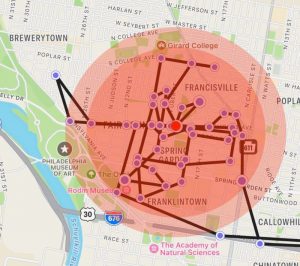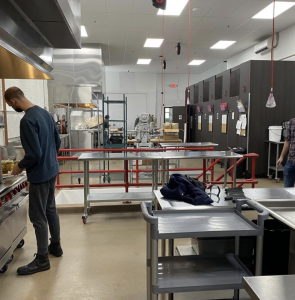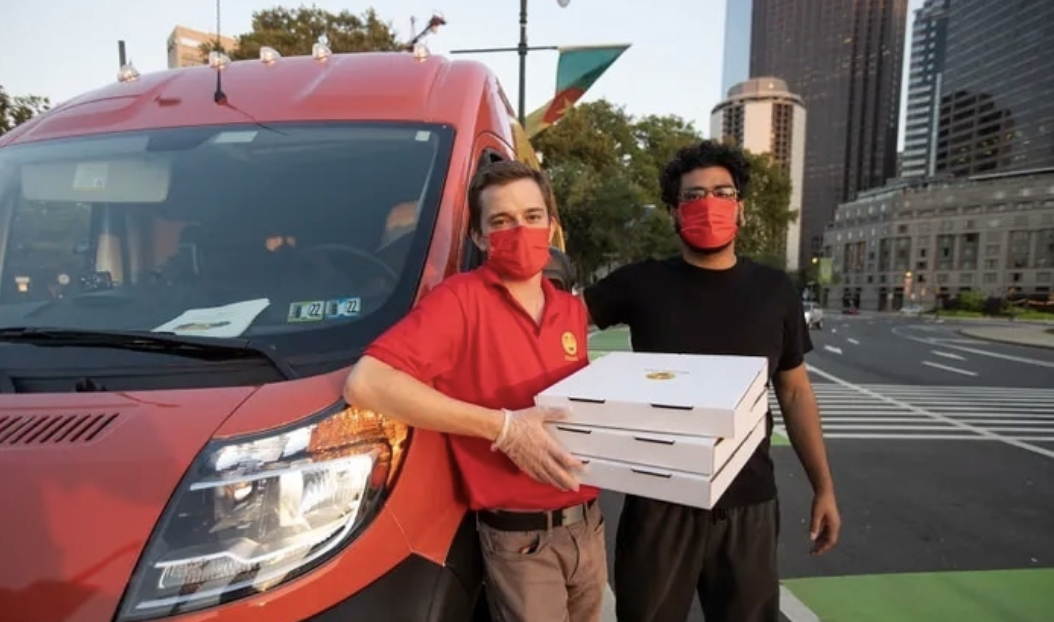Muncho, an early-stage pizza delivery startup in Philadelphia, is using oven-equipped vans to cook pizzas while en route to customers’ houses. With plans to add more advanced cooking tech and an owner-operator model to scale up to additional neighborhoods, early trials are attracting repeat customers and thrilling them with steaming-hot pizzas that can arrive in less than 10 minutes.
Founder Adam Chain, who graduated from Pennsylvania State University with an economics degree in 2015, said Muncho’s genesis came from ordering a pizza during the halftime of a football game—and it didn’t arrive until two hours later. Because it was 10 PM on a Sunday, many of the independent pizzerias were closed, and many of the national brands regularly struggled to deliver in the short timeframes often associated with Big Pizza.

Muncho’s first van waits at the red dot, which is at the center of its territory.
“Domino’s is open until 2 AM, but they only have one guy doing a five-mile radius, so the website may claim a 45-minute delivery, but that really means nothing,” he said. After deeply considering the conundrum, he decided “to create a model that allows us to stay open as long as we want … which means really low overhead and delivering stuff fast.”
Chain’s initial research suggested opening a pizzeria that began service at 10 AM to capture the late-night crowd, but that gave way to uncovering the inherent issues preventing even the most tech-enabled restaurant brands from delivering fast, hot pizzas outside of peak hours.
“That’s when I got serious about it,” he said of developing a more specific business model. “I was talking to as many people as I could, would you like this and what would you pay for this? Trying to figure out the price point, and it was more about starting as small as possible, trying to prove the concept simultaneously, and what’s what we’ve done really well so far.”
The result is Muncho, which is just two months old and stages vans in dedicated neighborhoods where a driver can immediately react when a customer places an order. Starting operations in Philadelphia’s Fairmount neighborhood, the vans are equipped with ventless convection ovens the driver loads as soon as an order comes in. Back in the driver’s seat, the operator drives to the customer’s house while the pizza cooks, ideally timed to be ready at the exact moment of arrival.
With an early goal of just selling a few pizzas a night to test the software and driver logistics—having spent just $100 on an Instagram ad—Muncho’s first customers were delighted to learn how the pizzas were cooked during the delivery, and that they could arrive in minutes, not hours. The company is now approaching 300 customers, including one who has ordered 17 times since mid-November and another in his eighties who has ordered every night since learning about the company.
“The repeat customer rate is approaching 50 percent,” Chain said. “This is all word of mouth, all in less than a square mile of one city … with any company, the more success you have in the beginning, the harder it gets.”
That difficulty includes making big decisions about where to go from here. With a small commissary kitchen space that’s already maxed out, Muncho has signed a lease for a much larger prep kitchen that will be ready in March. That will bump its capacity to 12 vans, so the company is able to branch out into additional neighborhoods—all with their own dedicated drivers for rapid pizza deployment.
Driving towards an acquisition
Customers going to Muncho.com are pushed to the menu page if they’re within the company’s initial territory, which includes a big green bar providing a delivery ETA, which is typically 7, 8 or 9 minutes. That tends to excite customers, while also providing the basics on how the pizzas are cooked, intriguing them even further.
Chain said the company has seen entertaining reviews and social comments, like one saying, “Did I just get a pizza delivered from a van? Yes. Was it delicious? Yes.” Another said “This pizza just got made in a van [and] got to my house in five minutes—this is the future.”

The company has already outgrown its first commissary kitchen space.
Fairmount is just one ZIP code with an average age of 31, made up of many young professionals and families, but Chain said the company is trying to figure out who is most drawn to the concept as it plans its geographic expansion. At present, it plans to move across the bridge to University City, with twice the number of residents, half of whom are college kids.
“All those demographic challenges that we’re going to face will help us internally answer a ton of questions,” Chain said. “That’s the next big step for us.”
The company’s founder is working with a group of angel investors who threw $150,000 at the concept, including people with experience in venture capital, logistics, technology and early-stage businesses.
Looking further ahead, Muncho is planning to upgrade its cooking technology in stages, ultimately working toward a fully automated solution enabling its operators to focus on driving and customer service, rather than cooking and timing their drive times for the perfect, steamy presentation.
Because the vans themselves are a capital-intensive outlay for such a young company, Chain is developing what he calls an individual service provider program where experienced delivery drivers could buy their own vans, which Muncho would wrap and outfit. The drivers then would do the deliveries and be paid hourly for their efforts, with a goal of allowing them to make $30 an hour, helping the company scale and providing better salaries for drivers onboarding from other companies.
“We’re spending a lot of time cleaning [the vans] and stuff like that, so if we’re able to shift a lot of that onto someone who wants to buy their own van and make a lot of money doing it, then I think it could be a win-win,” Chain said. “But we still have probably 10 more meetings just about this program before it really moves forward.”
As the brand prepares for its second phase, it’s also considering additional cuisine types—like chicken wings and tacos—and the idea that it could build fleets for different foods, to ensure that its service doesn’t degrade as its reach and offerings expand.
Saying he has a notebook filled with additional business ideas, Chain isn’t shy about building the business toward an ultimate acquisition, which he called the “end game.” Whether that suitor could be a company like Yum Brands, Reef, Amazon or a private equity firm, he expects the cook-on-the-way category to quickly fill with additional competition.
“Failure or success, I still think this process is going to help personally determine what stage of companies I’m best at working within and then go from there,” Chain added. “Maybe I’ll start another one. Maybe I’ll become an advisor. I’m going to learn a lot about myself, personally, through this process that has nothing to do with pizza or anything like that.”


